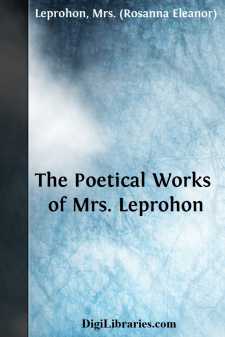Categories
- Antiques & Collectibles 13
- Architecture 36
- Art 48
- Bibles 22
- Biography & Autobiography 813
- Body, Mind & Spirit 142
- Business & Economics 28
- Children's Books 17
- Children's Fiction 14
- Computers 4
- Cooking 94
- Crafts & Hobbies 4
- Drama 346
- Education 46
- Family & Relationships 57
- Fiction 11829
- Games 19
- Gardening 17
- Health & Fitness 34
- History 1377
- House & Home 1
- Humor 147
- Juvenile Fiction 1873
- Juvenile Nonfiction 202
- Language Arts & Disciplines 88
- Law 16
- Literary Collections 686
- Literary Criticism 179
- Mathematics 13
- Medical 41
- Music 40
- Nature 179
- Non-Classifiable 1768
- Performing Arts 7
- Periodicals 1453
- Philosophy 64
- Photography 2
- Poetry 896
- Political Science 203
- Psychology 42
- Reference 154
- Religion 513
- Science 126
- Self-Help 84
- Social Science 81
- Sports & Recreation 34
- Study Aids 3
- Technology & Engineering 59
- Transportation 23
- Travel 463
- True Crime 29
The Poetical Works of Mrs. Leprohon
Description:
Excerpt
When, in after ages, the literature of Canada comes to be written, it is to be hoped that among the mighty sons and daughters of genius now unknown, or as yet unborn, some room will be kept for the brave and loving pioneers who “gave the people of their best,” and sang the songs of duty and patriotism and hope, ere life in our young land had ceased to be a struggle. With the growth of wealth and the spread of prosperity, will come leisure for more than material interests; and thus, in course of time, the author who has something to say will find an audience, prepared by culture and not too busy to listen to it. And, as supply is generally commensurate with demand, there will then be a literary class of corresponding merit. At least, something like this has been the rule in the progress of nations. But if those who come after, thus favored by circumstances, surpass their predecessors in literary skill or power, not less deserving are the latter who, with little prospect of reward, bore the burden and the heat of the day. This early stage in a nation’s literature has, indeed, an interest and a value of its own, which only meet with due appreciation from a judicious and grateful posterity. If it has not the rich, warm splendor of the later morning, it has the welcome promise of the dawn, and a tender beauty of its own.
In this band of pioneers Mrs. Leprohon must be conceded a distinguished place. None of them has employed rare gifts of head and heart to better purpose; none of them had a wider range of sympathy; none of them did more willing service, with the purest motives, in all good causes. And, it may be added, none of them was more happy in attaining, during life, the admiration and friendship of a large though select circle of every creed and race among her compatriots. It is in order to place in the hands of those who thus loved and honored her a memorial of what she was at her best, intellectually and morally, that this little volume has been prepared. It contains the emotional record of a blameless and beautiful life, the outcome of a mind that thought no evil of any one, but overflowed with loving kindness to all. Before pointing out, however, what we consider the salient qualities in Mrs. Leprohon’s poetry, it may be well to give our readers a brief sketch of her too short career.
Rosanna Eleanor Mullins was born in the city of Montreal in the year 1832. It is almost unnecessary to state that she was educated at the Convent of the Congregation of Notre Dame, so numerous are her affectionate tributes to the memories of dear friends associated with that institution. Long before her education was completed, she had given evidence of no common literary ability. She was, indeed, only fourteen years old when she made her earliest essays in verse and prose. Before she had bid adieu to the years and scenes of girlhood, she had already won a reputation as a writer of considerable promise, and as long as Mr. John Lovell conducted the Literary Garland, Miss Mullins was one of his leading contributors. She continued to write for that excellent magazine until lack of financial success compelled its enterprising proprietor to suspend its publication. It was some time before another such opportunity was given to the Canadian votaries of the muses of reaching the cultivated public. In the meanwhile, however, the subject of our sketch—who had, in 1851, become the wife of Dr. J. L. Leprohon, a member of one of the most distinguished Canadian families—was far from being idle. Some of her productions she sent to the Boston Pilot, the faithful representative in the United States of the land and the creed to which Mrs. Leprohon was proud to belong. She was also a frequent and welcome contributor to several of the Montreal journals. It is a pleasing evidence of her gentle thoughtfulness for a class which many persons in her position regard with indifference that she wrote, year after year, the “News-boy’s Address” for the True Witness, the Daily News and other newspapers. One of her most pathetic poems, “The Death of the Pauper Child” may also be mentioned as a striking instance of that sweet charity which comprehended in its sisterly range the poor, the desolate and the suffering. The Journal of Education, edited by the Hon. P. J. O. Chauveau, himself an honor to Canadian Literature; the Canadian Illustrated News, edited by Mr....


